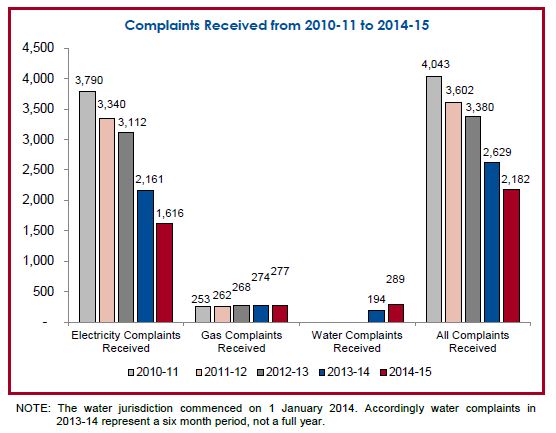Our Work in 2014-15
Complaints and Enquiries Received
Over the 12 month period from 1 July 2014 to 30 June 2015, the Energy and Water Ombudsman received 2,182 complaints and closed 2,261 complaints. In addition 94 enquiries were received. The following chart shows the breakdown of complaints and enquiries received for gas, electricity and water in 2014-15.
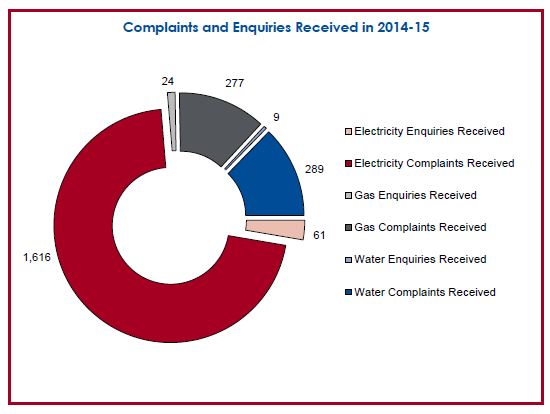
Trends in Complaint Numbers
Overall complaints have decreased by 17% in 2014-15 including a 25% decrease in electricity complaint numbers this year as shown in the following chart. Gas complaint numbers have remained relatively steady. For water complaints, 2014-15 was the first full year of the jurisdiction and cannot be directly compared to 2013-14 which only included water complaints for six months (from 1 January 2014 to 30 June 2014).
Further details of the trends in electricity complaints over the last five years are shown in the following chart. After a significant increase in electricity complaints in 2009-10 and 2010-11, there has been a significant decrease over the past four years, including a 31% decrease in 2013-14 and a further 25% decrease in 2014-15.
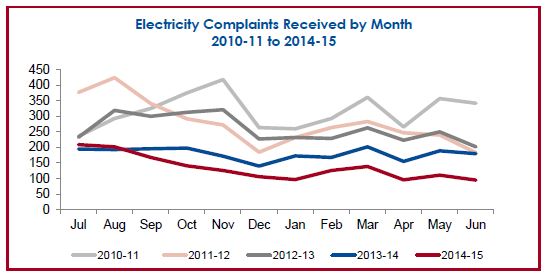
Complaints Finalised
Complaints are finalised through resolution by the electricity, gas or water provider where possible and, if the matter cannot be resolved at that level, the complaint is investigated. The complaint stages and action taken by the Energy and Water Ombudsman at each stage are shown below.
Stage 1 Complaints |
The person has not yet contacted the electricity, gas or water provider. The customer is referred to the relevant provider. |
Stage 2 Complaints |
The person has had at least one contact with their electricity, gas or water provider (such as contact to the call centre) but the complaint has not been resolved. The Energy and Water Ombudsman refers the complaint to a ‘higher level’ officer for resolution within 10 business days. |
Investigated Complaints |
If a complaint remains unresolved after it has been referred to a ‘higher level’ officer at the relevant provider, the matter is investigated by the Energy and Water Ombudsman. |
In 2014-15, there were 2,261 complaints closed, comprising 1,671 electricity complaints, 281 gas complaints and 309 water complaints.
Timeliness of Complaint Handling
The Energy and Water Ombudsman has maintained its high levels of timeliness in 2014-15 with 83% of electricity complaints, 94% of gas complaints, 80% of water complaints and 84% of all complaints being finalised within 10 business days. The following charts show the timeframes for resolving electricity, gas and water complaints in 2014-15.
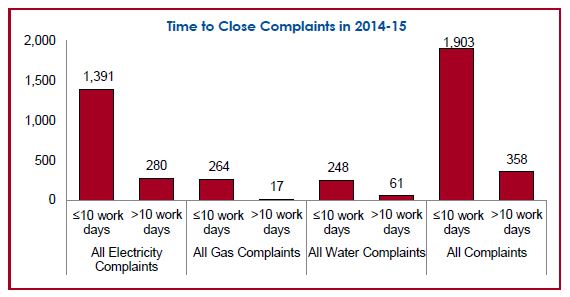
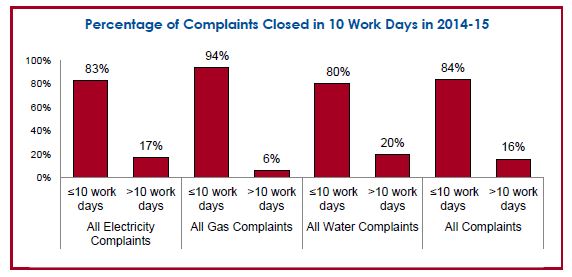
Issues Raised in Complaints
Issues raised in electricity, gas and water complaints fall into the following categories:
Billing |
Complaints about bills including alleged errors and disputes over meter readings and fees and charges. |
Credit |
Complaints about payment arrangements, debt collection issues and payment difficulties. |
Customer Service |
Complaints about alleged poor customer service. |
Supply |
Complaints about the quality and reliability of supply of electricity, gas or water. |
Provision |
Complaints about connection issues. |
Land |
Complaints about the way a Scheme Member has exercised its powers in relation to land. |
Service Standard Payments |
Complaints about regulated payments for poor service. |
Transfer |
Complaints about transfers from one supplier to another. |
Marketing |
Complaints about the marketing activities of Scheme Members. |
Drainage, Irrigation or Sewerage |
Complaints about the supply of drainage, irrigation or sewerage. |
General |
Complaints not covered by other categories, including complaints by a person affected by a water service. |
Most Common Issues Raised
As for previous years, during 2014-15, billing remains the most common issue raised for electricity, gas and water complaints. Billing issues were raised in 44% of complaints received (40% of electricity complaints, 55% of gas complaints and 58% of water complaints). The decrease in electricity complaints during the year has been primarily in the area of billing. For electricity complaints, there was a 41% decrease in billing issues in 2014-15 compared to 2013-14.
Credit is also a common issue for energy complaints, and credit issues were raised in 34% of electricity complaints and 26% of gas complaints.
The following charts show the trends in issues raised in complaints over the last five years. "Other" includes Marketing, Transfer and Service Standard Payment and complaints by a person affected by a water service.
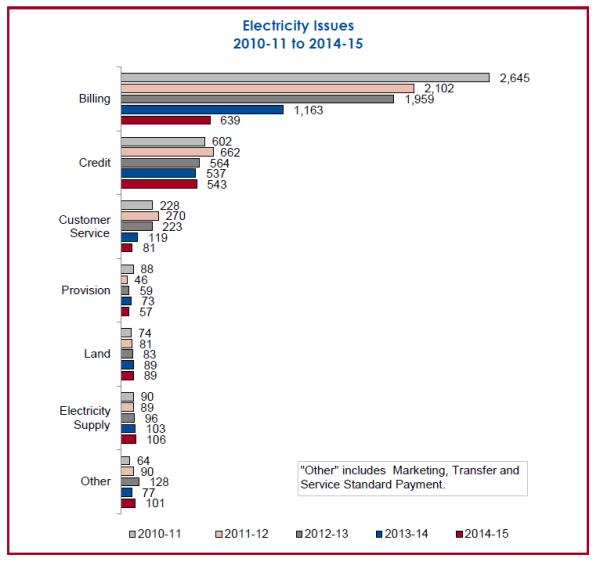
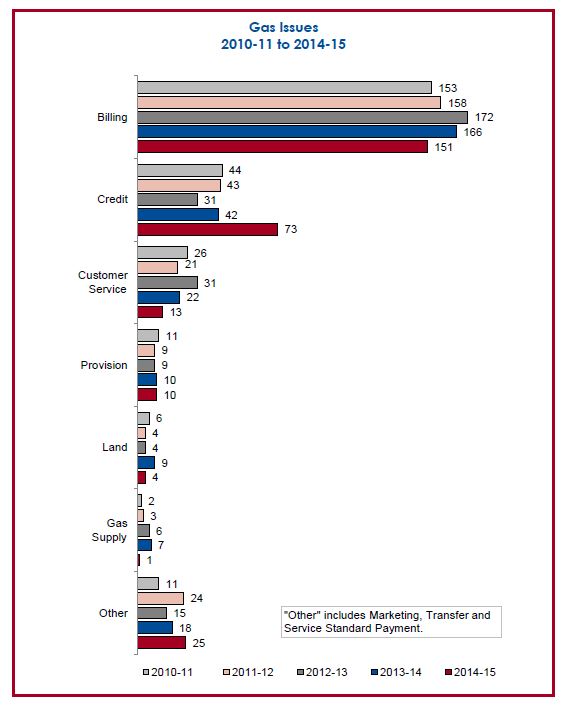
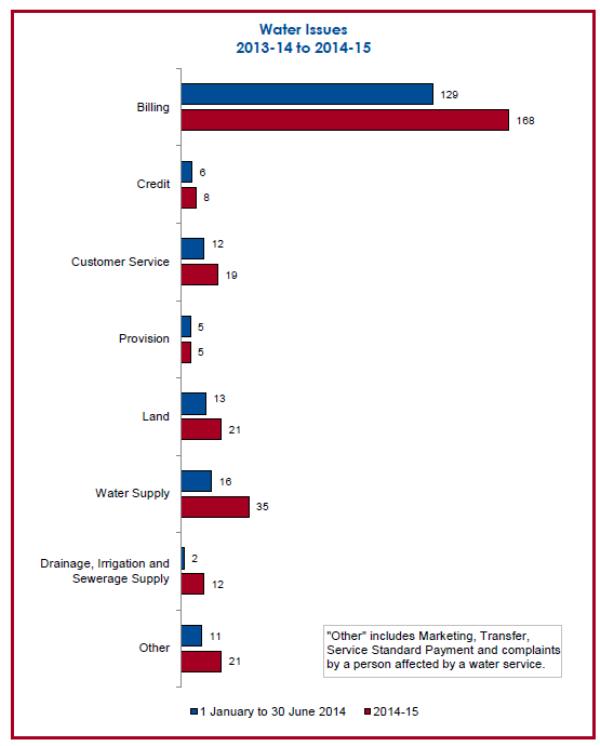
NOTE: The water jurisdiction commenced on 1 January 2014. Accordingly water complaints in 2013‑14 represent a six month period, not a full year.
Reasons for Billing and Credit Complaints
Complaints about billing and credit issues may be made for a range of reasons. The main types of billing and credit issues are:
Types of Billing Issues |
||
High Bill |
Bill higher than expected. |
|
Alleged Error |
Alleged billing errors. |
|
Meter |
Metering issues. |
|
Non Application |
Disconnections due to the customer not applying for an account. |
|
Tariff |
Incorrect rates or lack of information about tariffs. |
|
Fees |
Fees and charges. |
|
Pensioner Rebate |
Rebate has not been applied or has been incorrectly applied. |
|
Format |
Format or lack of adequate information on bill. |
|
Other |
Includes backbills, GST, historical debt, payment periods and security deposit. |
|
Types of Credit Issues |
||
Arrears |
Credit arrears. |
|
Debt Collection |
Credit rating or debt collection issues. |
|
Bill and Debt Payments |
Customer has received a high bill and has difficulty in payment, has difficulty paying debts or problems with payment arrangements. |
|
For electricity, gas and water complaints, the main reasons for billing complaints are high bills and alleged errors. For gas and water complaints, fees are another key reason for billing complaints.
For both electricity and gas, the main reason for credit complaints is payment of arrears and debt collection.
The trends over the last five years in the different types of billing and credit issues are shown in the following charts.
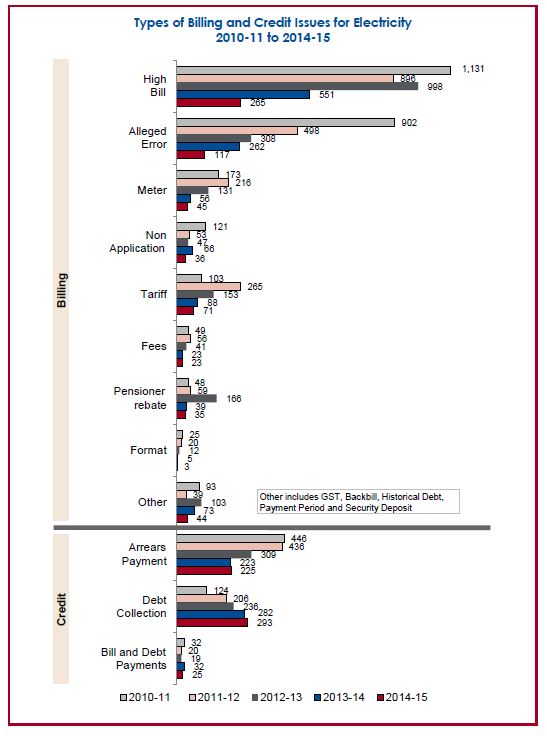
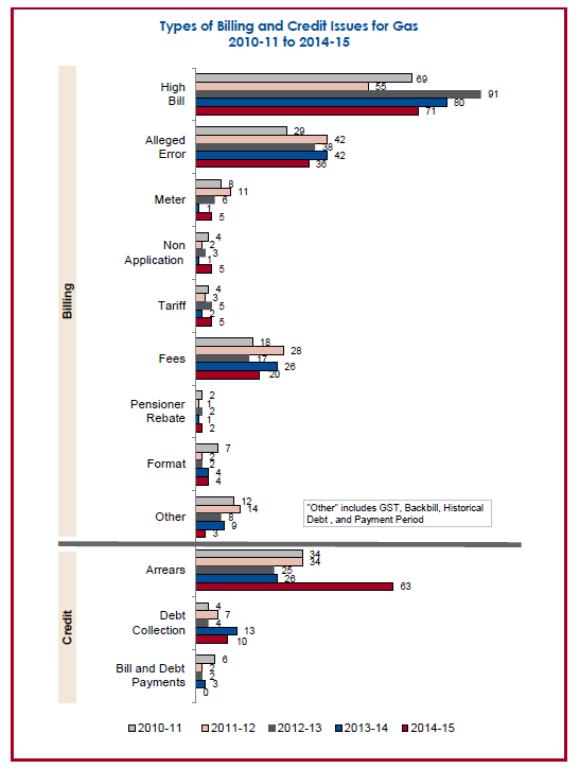
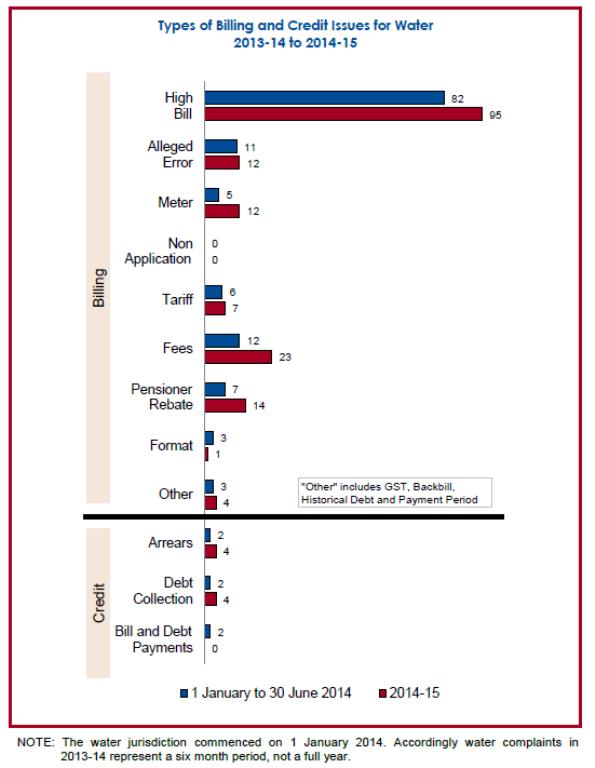
Disconnections
Gas and electricity retailers sometimes disconnect supply when a customer has failed to pay their bill or has not applied for an account when they take up a new residence. Before disconnecting, a reminder notice and then a disconnection warning should be sent. Complaints about reminder notices and disconnection warnings are recorded by the Energy and Water Ombudsman as impending disconnections. Complaints about a disconnection that has already occurred are recorded as actual disconnections. Water providers typically restrict a service rather than disconnect.
During 2014-15, there were:
- 1,182 electricity complaints involving billing and credit issues and, of these, 222 involved actual disconnection and 33 involved an impending disconnection;
- 224 gas complaints involving billing and credit issues and, of these, 55 involved actual disconnection and 9 involved an impending disconnection; and
- 176 water complaints involving billing and credit issues and, of these, 3 related to water restriction and 1 to water disconnection.
The following charts show trends in electricity billing and credit issues involving, and not involving, disconnections. For electricity there was a decrease in complaints about both actual and impending disconnections in 2012-13, which has been maintained in 2013-14 and 2014-15. For gas, complaints about disconnections have increased compared to previous years.
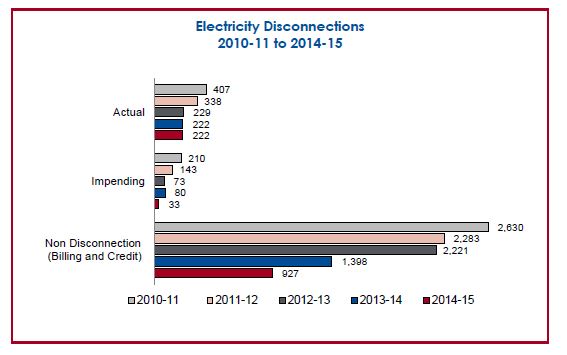
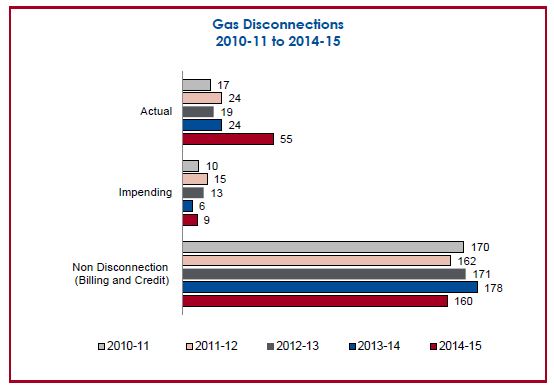
Actual or impending disconnections can occur for the following reasons:
Reasons for Disconnection |
|
Arrears and Backbills |
Customer has not paid their bill or a backbill for a previous period. |
Alleged Error |
Customer claims that they have been, or are about to be, disconnected due to an alleged error by the retailer. |
Non Application |
The customer has moved into or acquired a property and not applied to their retailer for an account to be established. |
For both electricity and gas, most complaints received about disconnections relate to arrears in bill payments. The following charts show the trends in the reasons for all disconnections (actual and impending) over the last five years.
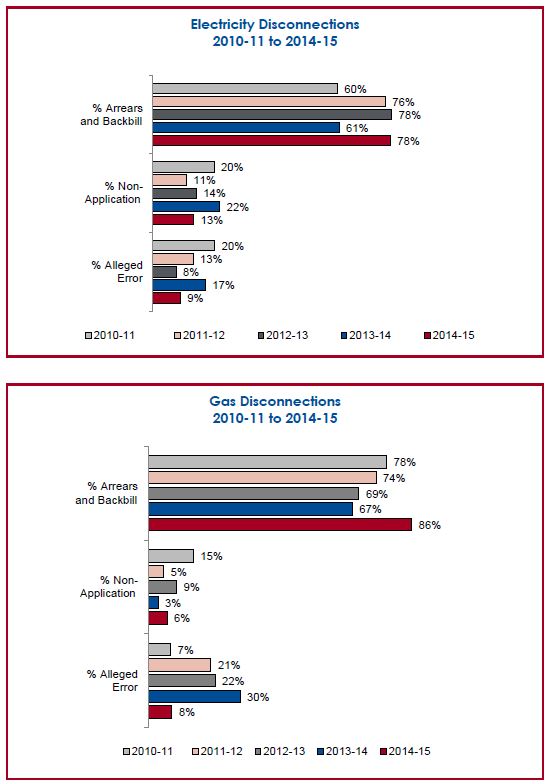
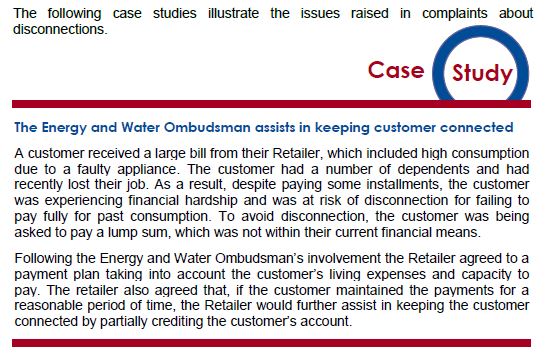
Investigated Complaints
The Energy and Water Ombudsman refers complaints to the electricity, gas or water services provider to resolve the matter in the first instance and most complaints are resolved directly between the customer and the provider. If the customer does not consider the matter is resolved they can bring their complaint back to the Energy and Water Ombudsman for investigation.
Resolution Through Further Referral
In some complaints, where there is the potential for an early resolution, the Energy and Water Ombudsman may ask the customer to give their provider a final opportunity to resolve the complaint. The customer and the provider are informed that, if the matter is not resolved in a reasonable timeframe, the customer can bring it back to the Energy and Water Ombudsman and it will be investigated.
Investigations Finalised
There were 253 investigated electricity complaints, 15 investigated gas complaints and 49 investigated water complaints finalised during 2014-15.
As shown in the following chart, consistent with a decline in electricity complaints received, the number of investigated electricity complaints in 2014-15 has decreased compared to 2013-14.
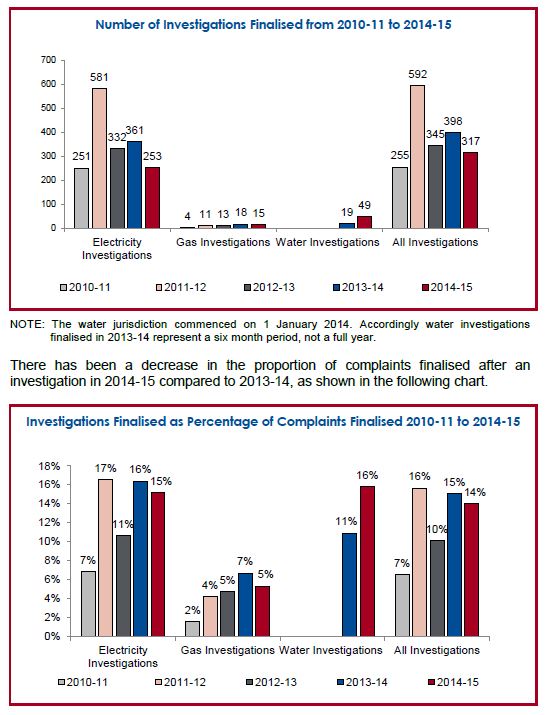
Outcomes of Investigated Complaints
Complaints that proceed to investigation may be finalised for the following reasons:
- The Energy and Water Ombudsman facilitates a resolution;
- Investigation of the matter shows that it is out of jurisdiction;
- The investigation shows the complaint is not sustained;
- The investigation shows the matter is sustained and the Energy and Water Ombudsman makes a binding determination including an appropriate remedy; or
- Further investigation is not warranted for a range of reasons.
For most investigated complaints the investigation ceases because:
- The Energy and Water Ombudsman investigating officer is able to facilitate a resolution between the customer and their electricity, gas or water provider. This occurred in 85 (27%) of the 317 investigations finalised in 2014-15; or
- The investigation shows the complaint is not sustained. This occurred in 225 (71%) of the 317 investigations finalised in 2014-15.
Smaller proportions of complaints were finalised because they were found, during the investigation, to be out of jurisdiction or further investigation was not warranted.
There were no binding determinations by the Energy and Water Ombudsman in the 2014-15 reporting period.
Outcomes of Investigated Electricity Complaints
The following chart shows the outcomes of the investigated electricity complaints finalised in 2014-15 broken down by the issue of the complaint.
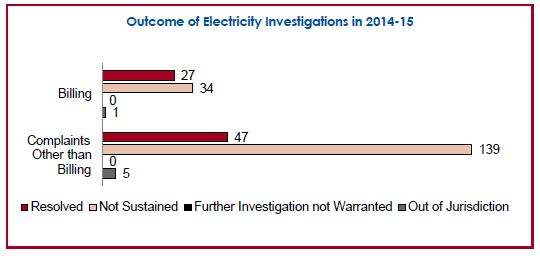
Outcomes of Investigated Gas Complaints
The outcomes of the 15 investigated gas complaints were that six complaints were resolved and nine complaints were not sustained.
Outcomes of Investigated Water Complaints
The outcomes of the 49 investigated water complaints were that five complaints were resolved, 43 complaints were not sustained and one complaint was out of jurisdiction.
Resolutions for Investigated Complaints
Electricity, gas and water providers may offer a range of actions to resolve a complaint including reducing bills, correcting or removing credit listings, providing the complainant with more time to pay, or providing compensation, an explanation or an apology. Bills may be reduced for a variety of reasons including correction of errors (for example, payment of rebate entitlements). Compensation may be paid where a customer has suffered a loss or damage due to the actions of their electricity, gas or water provider.
Resolutions for Investigated Electricity Complaints
In 2014-15, 148 actions were offered by electricity providers to resolve the 74 investigated electricity complaints that were resolved during the year.
The number of actions undertaken is higher than the number of complaints resolved as there is often more than one action taken by the provider to resolve the complaint. For example, the retailer may reduce the bill and offer an apology.
The following chart provides the breakdown of the actions offered to resolve investigated complaints for billing complaints and complaints about other issues.
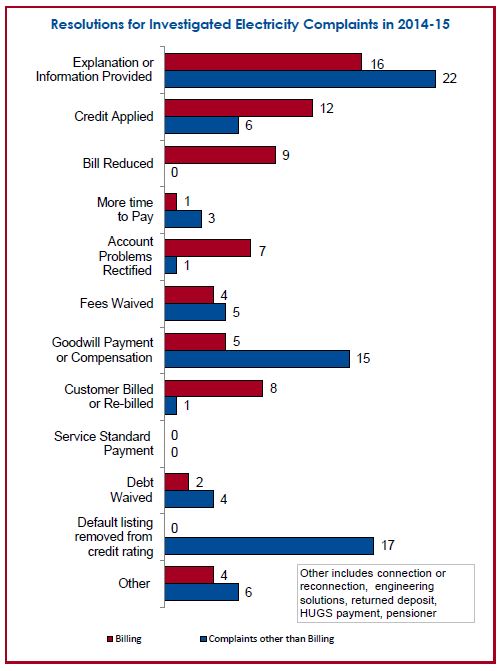
Resolutions for Investigated Gas Complaints
There were 14 actions offered by gas providers for the six investigated gas complaints that were resolved in 2014-15, including:
- Explanation or information provided;
- Fees or debt waived;
- Bills reduced, rectified or payment terms extended; and
- Goodwill payment or compensation.
Resolutions for Investigated Water Complaints
There were seven actions offered by water providers for the five investigated water complaint that were resolved in 2014-15, including:
- Explanation or information provided;
- Debt waived or a credit applied; and
- Goodwill payment or compensation.
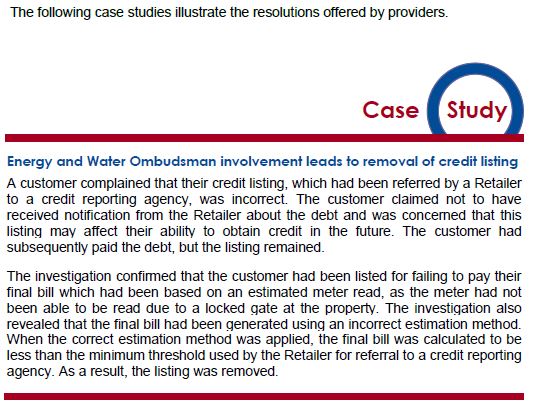
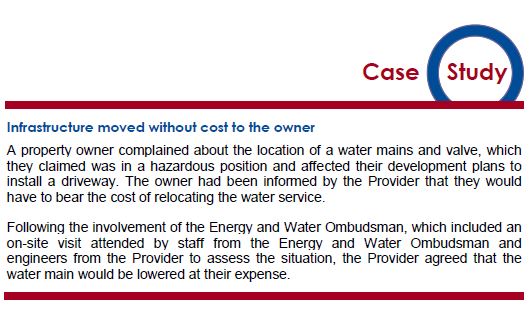
Go to next section of Annual Report >>
Go to next section of Annual Report >>
Go to previous section of Annual Report >>
Go back to Annual Reports page >>
Download Our Work in 2014-15 as a PDF >>
Our publications are available download in portable document format (PDF). To open PDFs you will require Adobe Reader which can be downloaded for free at http://www.adobe.com/products/acrobat/readstep2.html.

